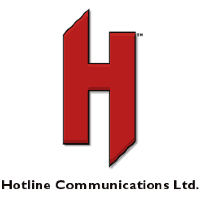Hotline Communications

The logo for Hotline Communications, once dubbed "the best kept secret" on the internet by the L.A. Times
|
Hotline Communications Limited (HCL) was a software company founded in 1997, based in Toronto, Canada, with employees also in the United States and Australia. Hotline Communications' main activity was the publishing and distribution of a multi-purpose client/server communication software product named Hotline Connect, informally called, simply, Hotline. Initially, Hotline Communications sought a wide audience for its products, and organizations as diverse as Avid Technology, Apple Computer Australia, and public high schools used Hotline. At its peak, Hotline received millions of dollars in venture capital funding, grew to employ more than fifty people, served millions of users, and won accolades at trade shows and in newspapers and computer magazines around the world.
Hotline eventually attracted more of an "underground" community, which saw it as an easier to use successor to the Internet Relay Chat (IRC) community. Shortly after the September 11, 2001 attacks, Hotline Communications lost the bulk of its VC funding, and went out of business later that month. All of its assets were acquired in 2002 by Hotsprings, Inc., a new company formed by some ex-employees and shareholders. Hotsprings Inc. has since also abandoned development of the Hotline Connect software suite; the last iteration of Hotline Connect was released in December 2003. Currently, only a few servers remain using the Hotline protocol, essentially private.
Hotline was designed in 1996 and known as "hotwire" by Australian programmer Adam Hinkley (known online by his username, "Hinks"), then 17 years old, as a classic Mac OS application. The source code for the Hotline applications was based on a class library, "AppWarrior" (AW), which Hinkley wrote. AppWarrior would later become litigious, as Hinkley wrote parts of it while he was employed by an Australian company, Redrock Holdings. Six other fans of Hotline, David Murphy, Alex King, Phil Hilton, Jason Roks, David Bordin, and Terrance Gregory, joined Adam Hinkley's efforts to promote and market the Hotline programs, working day and night and using the company's own products to stay in touch from across the USA, Canada, and Australia. Eventually, Canadian Jason Roks approached Adam Hinkley and encouraged him to move to Toronto, where Hotline Communications, Ltd. was incorporated. In 1997, Hotline won a "Best of the Show" award from one of the award ceremonies concurrent with the Boston MacWorld Expo. It received accolades in computer magazines and the mainstream press from Macworld Sweden (which awarded it a "Golden Mouse Award") to the Los Angeles Times, which called it one of the "best kept secrets on the internet", as well as a short article in Wired Magazine's September 1997 issue. At the time, the company's main objective was to release a stable Windows-compatible version to reach a wider audience.
...
Wikipedia
